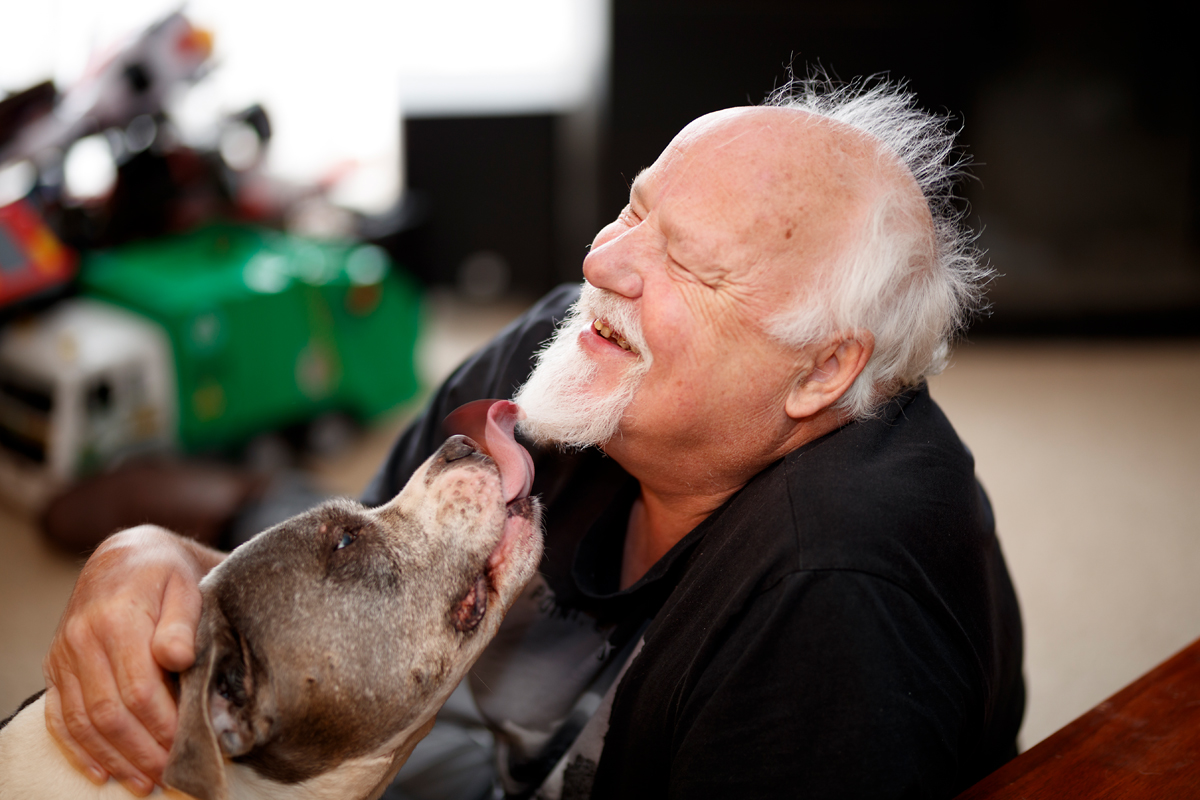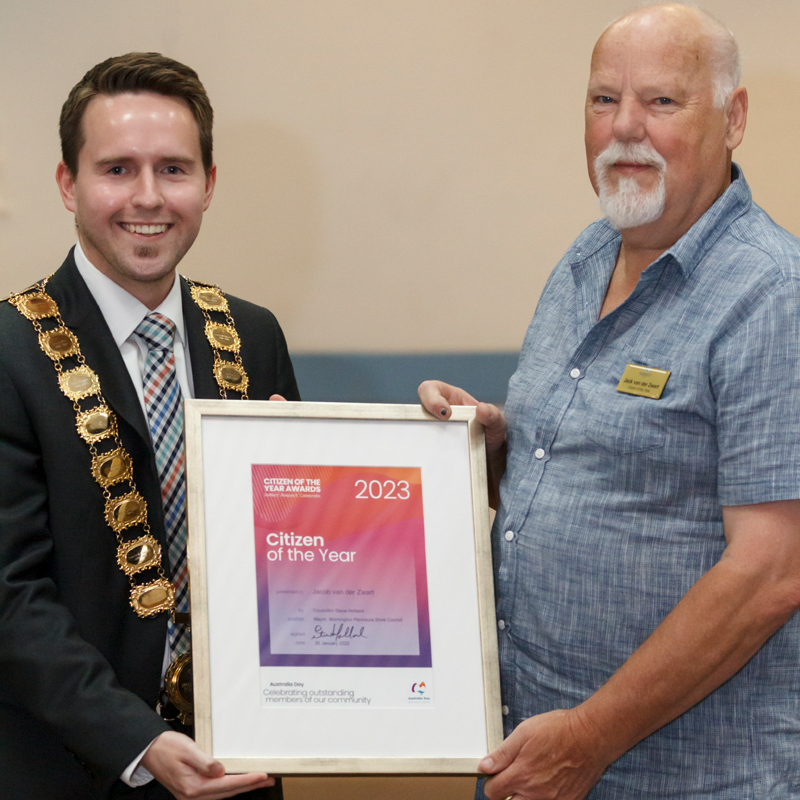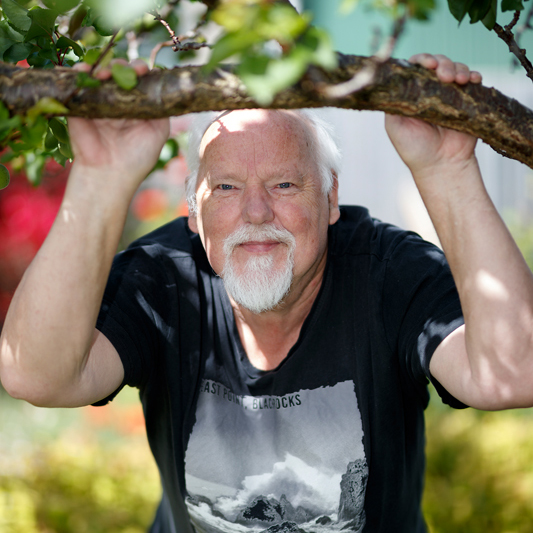
Rosebud couple Jack Van Der Zwart and his wife Arina had no qualms about becoming foster parents – even about their first foster child having special needs. At two months of age, the baby had only ever known hospital, only being picked up for feeding or treatment. Did Jack have any trepidation about fostering a special needs baby? “None. None at all.”
“In me, where it stems from is that my parents migrated in 1968 from Holland when I was twelve and a half. Before then, every holiday I had was with my grandparents. They lived in an out-of-the-way place near a forest. My grandfather was the director of a boys’ home. He had a big market garden out the back where he grew lots of vegies. He’d put them on the back of his bicycle and take them to the boys. When he came home at night, he’d sit in his big leather chair with a gigantic storybook and tell us stories while he was smoking his big pipe, with my brother and me sitting on the armrests. I can smell the pipe and still see it all happening in front of me. I think my nurturing and caring came from that.”
Just near Jack’s grandparents’ house, where Jack used to play, there was a huge farmhouse he could never get to. Years later, he learned that his wife Arina spent all her holidays in that house.
“I didn’t meet her until we were here in Australia. That is fate.”
From 1980 until 2018, when, for health reasons, Jack and Arina decided not to foster any more children, they fostered a total of twenty-two children.
For his work with foster children and his volunteering to cook for Rosebud’s homeless and provide meals to those in need, Jack was awarded Citizen of the Year in 2023 by the Mornington Shire Council.
Jack says the idea of fostering children came from a TV ad.
“Both my wife and I are from big families – I’m from a family of ten, she of nine – and we always wanted a big family. We had healthy children of our own and wanted another one, and at the time, they were advertising for foster homes for children who were in homes but wanted to be part of a family, either fostered or adopted. I was watching the ad one day, and I was heartbroken. It really got to me. We started talking, and I said, ‘Why don’t we foster.’ We had a really good think about it and said, ‘Let’s give it a try.’”
At the time, St Joseph’s Home for Children had group homes housing children where a person or couple would be employed to act as parents. They would live life as usual, carrying on their existing jobs and acting as a family for their foster children as well as their own children. Jack and Arina decided this was for them.
After Jack and Arina’s first foster child came a 12-year-old girl, then two more girls, making a total of four foster children plus their own four children, who treated them as brothers and sisters.


Photos Yanni
“Nobody was treated any differently,” Jack says. “They were all one and the same. They all had their chores, and we worked as a family. It was really, really good. Even now, those first four still see my children. They have all grown up with children of their own. They visit each other regularly and call themselves brother and sister. They’re very, very close.”
What did Jack and Arina learn along the way that they would pass on to others thinking of fostering?
“Don’t do it as a job. It’s not a job. It’s something you do from your heart, and you don’t treat them any differently from your own.”
Although he’s not religious, Jack volunteers at the Connect Christian Church in Browns Road Boneo, cooking meals for the homeless and needy. Cooking comes easily to Jack, who worked for many years on the peninsula as a chef, starting at the Portsea Hotel as a dishwasher and working his way up to managing an all-day breakfast and juice bar next door. Jack also worked at the Peninsula Hot Springs, The Rosebud Country Club, Rosebud Hotel and The Gourmet Galley in Rosebud.
“One of the successes we had with our foster kids was cooking meals, sitting at the table and spending time with them, asking ‘How was your day today? What did you learn? ‘Today, our own grandchildren say, ‘Can you ask us questions about the world?’ and we’ll ask, ‘What was the capital of this or that? Tell me the answer to this sum or spell that.’ It’s not just sitting down and eating. They stay and play Monopoly or Scrabble. It goes on and on, and it becomes a big laughter thing. It’s togetherness – it’s what a home is supposed to be all about rather than on the idiot box or on their phone.”
What does Jack miss about fostering?
“The love, laughter, the feeling you get from it.”
Not all his foster children keep in touch. Some are interstate or overseas. “They have a life of their own, and you have to respect that,” Jack says. “It’s their business now. They’ve done their growing up with us, and they’ve now got their own lives, and they move on. We do hear from a lot of them at Christmas time or special occasions like birthdays, and we get phone calls. Some come and visit. They ask for their favourite meal. I see them when I go to the Rosebud shopping centre because we had local kids, and Arina and I get big hugs and kisses.”
Their first foster child still calls them daily. He visits Jack and Arina every Wednesday and has coffee and lunch. “If I was fit and healthy,” says Jack, “I’d have this house full of kids again.”
Jack’s motto is, “You can’t do anything about the past, but you can do everything about the future – the future’s all yours.”





